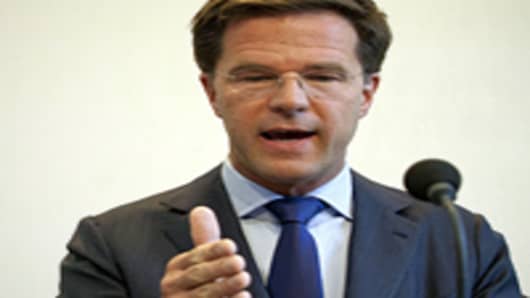As members of the Dutch parliament convened on Tuesday afternoon to discuss the collapse of the country’s government, analysts warned that the Netherlands will likely continue to face political instability that will set investors’ nerves on edge despite the country’s healthy fundamentals.
The spread between Dutch and benchmark German government bonds — the premium investors demand in order to hold Dutch debt rather than German paper — widened to a 3-year high on Monday as investors grew uneasy.
Rating agency Moody's said late on Monday that the collapse of the Dutch governing coalition was credit-negative for the Netherlands, but for the time being the country is still one of just four euro zone countries with a top AAA rating.
That helped the Netherlands to successfully sell government debt on Tuesday morning in a closely-watched auction, the first since the collapse of the government on Monday, although borrowing costs inched up. The amount on offer was relatively small.
“The political situation unfortunately does not help at this point as it fuels uncertainties, rumors about a loss of the AAA credit rating and market suspicion, despite healthy fundamentals, as the Netherlands is usually considered one to be a model student when it comes to structural balances and reforms,” Barclays analysts said in a note to clients.
“CDS [credit default swap] spreads with respect to Germany have been widening since the end of 2011, but especially since the end of March,” they said.
Politicians are trying to find a compromise between austerity and the need for growth.
The leader of the Dutch opposition Labour Party said during the parliament debate that the Netherlands could aim for a 2013 budget deficit of 3.6 percent of gross domestic product because EU rules allowed for exceptions and took reforms into account.
"The 3 percent deficit target exists with the addition that you don't need to comply if there are exceptional circumstances in the economy," Labour leader Diederik Samsom said.
The Dutch prime minister said his country faced a crisis and asked parliament to push through budget cuts after his government lost the support of its main political ally and tendered its resignation.
"Standing still is not good for the Netherlands. The problems are serious, the economy is stalling, employment is under pressure and government debt is growing faster than the Netherlands can afford," Prime Minister Mark Rutte told parliament on Tuesday, according to Reuters.
"Those are the facts and nobody can run away from them. I'm standing here without pretences, it is up to parliament and the voters."
Geert Wilders' Freedom Party had backed the government for the past 18 months but said he was no longer willing to be dictated to by Europe.
"It is the government, not the citizen, not Henk and Ingrid, who spent too much. Either we choose to act in the interests of Henk and Ingrid or we act in the interests of Brussels," Wilders said.
The parliament is discussing new elections and a looming deadline for the country to present budget plans to the EU.
Following the Dutch cabinet’s resignation, Prime Minister Mark Rutte could seek support from the parliamentary opposition to pass the budget before the April 30 deadline, when the Netherlands must send its budget to the European Commission, which will examine it to determine if it is in line with EU rules.
“No clear majority is expected to emerge from the ballot meaning that the fundamental political instability will continue. While this isn't per se a reason to disqualify the Netherlands, as the government will continue handling the current affairs (as was the case in Belgium), it is not the best configuration in current times when strong actions are needed to reassure anxious markets,” Barclays said.
- Reuters contributed to this story



